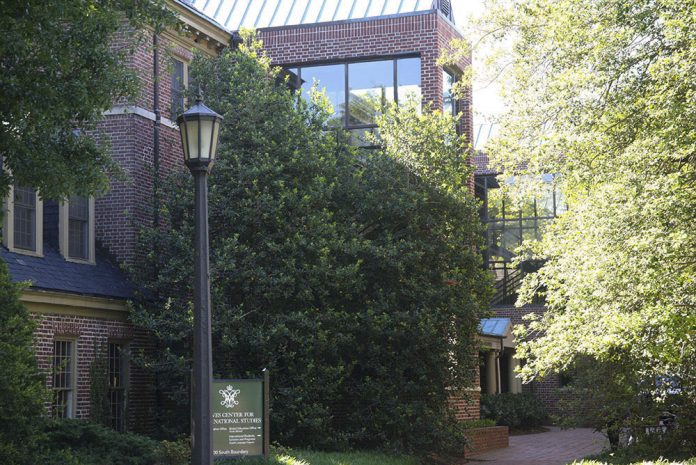Tuesday, Oct. 26, the College of William and Mary and the University of Virginia hosted a virtual Sustainability Abroad Panel discussion. It was an open discussion led by four panelists with input from the audience about their own experiences, perspectives and approaches.
The College’s Global Education Special Programs Advisor Marina LaMastro and UVA’s Education Abroad Advisor Hayley Spear were the discussion moderators. LaMastro started by explaining the collaboration between the College and UVA.
“We were trying to put together a few different events to create engagement across the two universities because … UVA and William and Mary have joined an agreement to be carbon neutral by 2030,” LaMastro said.
As the event began and people filed in, LaMastro asked the four panelists to introduce themselves. They were from different backgrounds and specialized in different topic areas. UVA’s Director of Global Environments and Sustainability Major and professor of architecture Phoebe Crisman spoke on the importance of representing differing ideas.
“It’s always good in these panels to have a diverse group of people because they’re gonna see the world differently,” Crisman said.
Merritt Steadman ’23, an audience member, shared their thoughts on the interdisciplinary nature of sustainability.
“Sustainability is something that can be incorporated into so many different fields and so it’s good to have faculty that are interested in it throughout the different academic fields,” Steadman said.
“Sustainability is something that can be incorporated into so many different fields and so it’s good to have faculty that are interested in it throughout the different academic fields,” Steadman said.
The event’s panelists included faculty from both universities. From the College: Global Research Institute Associate Director David Trichler, and assistant professor of government S.P. Harish spoke, and from UVA, assistant professor of global studies Spencer Phillips and the aforementioned Phoebe Crisman.
The organizers wanted the panel to be a general conversation that looked at whether we could learn any lessons on sustainability from abroad; they centered the discussion on four main questions.
Mia Parrott ’24, an audience member, stated that the question topics were helpful and insightful for those considering going abroad.
“They were very interesting,” Parrott said. “These were things that I have been wondering myself, too … here we have a lot more freedom to choose what we do day by day and a lot of places have barriers to them becoming more sustainable.”
Steadman echoed that sentiment, saying that the questions that led to useful discussion.
“I think they did a pretty good job of staying on track,” Steadman said. “They definitely talked about things that students should think about when studying abroad.”
The first question of what successes and challenges to sustainability they’ve witnessed abroad prompted only a few minutes of discussion. The panelists discussed seeing renewable energy in places that don’t have access to the electric grid and also being able to give their students a view of a different way of life. However, they also discussed the way that cost was a huge challenge to overcome in developing countries.
The moderator then moved on to cultural shifts and barriers that participants had witnessed when it came to sustainability.
Trichler was quick to point out how sustainability practices differ depending on the situation an area finds themselves in.
“It often goes back to priorities versus needs,” Trichler said. “And I think depending on where the study abroad is located, you can see different engagements with this question of sustainability…Where you sit determines what you prioritize.”
“It often goes back to priorities versus needs,” Trichler said. “And I think depending on where the study abroad is located, you can see different engagements with this question of sustainability…Where you sit determines what you prioritize.”
Harish brought the example of impoverished places in India cutting down trees for firewood. Where we think of soil erosion and other problems down the line, their thoughts are on lack of heating during the winter months. Other panelists chimed in with their own witnessed examples.
Taking a detour from sustainability, LaMastro asked the panel about things to consider before going abroad. Panelists responded with a variety of answers that all connected back to learning the culture of a country before visiting.
At the halfway point, the moderators assigned audience members and panelists to breakout rooms. In an email, Trichler wrote that he enjoyed meeting with students from both universities and was able to talk about future plans.
“We were able to discuss some broad opportunities at both schools, as well as specific opportunities at W&M based on their interests, including the Summer Fellows program at the Global Research Institute,” Trichler said.
Spear asked the third question of how panelists would encourage their students to have a positive relationship with local culture. The general consensus is through immersion: taking public transportation, eating the local food, trying to live in the same conditions that locals do. Doing these things exposes students to some of the systems that could be improved or are more sustainable than our systems. Spencer added that having a packed schedule takes away from efforts for immersion and learning.
The discussion moved onto the fourth question of how we can do education abroad while being sustainable. Spencer brought up the more research-based aspects of his programs since these aspects are what the students will take with them into the future and what will help facilitate sustainability research.
Crisman was more focused on carbon offsets — reducing carbon emissions in one area to compensate for extra emissions in another. She discussed a UVA International Studies Office partnership with the High Atlas Foundation in an offset program.
This discussion brought on a follow-up question by LaMastro about sustainability practices that the audience has brought back from abroad. The panelists’ answers ranged from everyday things such as less meat consumption and disposable cups to more societal issues such as consumerism and the problem of excess choice.

